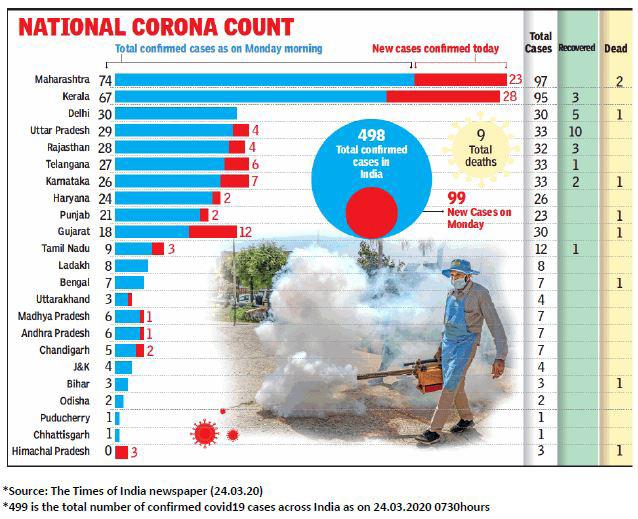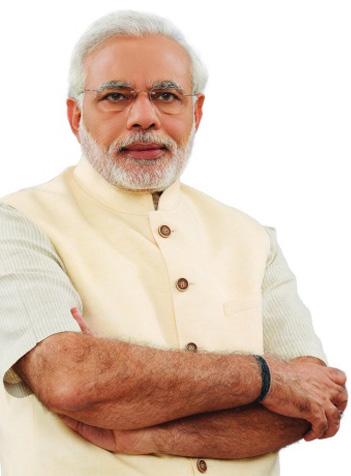
29 minute read
COVER STORY
COVID 19: A BIG THREAT FOR HUMANITY THE COMPLETE
FOR ENTIRE BUSINESSES ACROSS INDIA
Advertisement

The entire world is facing the huge crisis emerged due to Coronavirus which has been declared pandemic by WHO. This deadly virus which started four months ago from China has paralyzed the entire world with more than 5 Lakhs people infected globally and about 20000 people have lost their lives across all countries. The worst effected countries are China, Italy, US, Iran, Spain, Germany, UK and few others. A huge economic crisis has emerged globally due to this ongoing threat which has not spared a single Nation. In India too, the virus started spreading in month of March very quickly which infected more than 500 people and killed more than 09 people. The businesses have started suffering a lot in all verticals as entire world has announced complete lockdown to fight this deadly virus. Let’s check out the entire development report prepared by DT so far related with this pandemic.
COMPLETE LOCKDOWN: PM TAKING TOUGH CALL
Prime Minister Shri Narendra Modi called for a complete lockdown of the entire nation for the 21 days staring from 25th March in an effort to contain the COVID-19 Pandemic. In an address to the Nation the Prime Minister said that even those nations with the best of the medical facilities could not contain the virus and that the social distancing is the only option to mitigate it.
PM urged all of us to support social distancing majors to stop the spread of this deadly virus. He said, “All of you are also witnessing how the most advanced countries of the world have been rendered absolutely helpless by this pandemic. It is not that these countries are not putting in adequate efforts or they lack resources. The Coronavirus is spreading at such a rapid pace that despite all the preparations and efforts, these countries are finding it hard to manage the crisis. The analysis of happenings in all these countries since the last two months, and the opinion of experts has proved that there is only one way to effectively deal with Coronavirus - Social Distancing”.
The Prime Minister announced the entire country shall go under complete lockdown, which means total ban has been imposed on people from stepping out of their homes for a period of 21 days.
To deal with the economic challenges caused by the pandemic, Prime Minister announced the creation of ‘COVID-19 Economic Response Task Force’ under the Union Finance Minister. The Task Force will consult stakeholders, take feedback, on the basis of which decisions will be taken to meet the challenges. The Task Force will also ensure implementation of the decisions taken to meet these challenges. Prime Minister also urged the business community and higher income groups to look after the economic needs of those from lower income groups, from whom they take various services, urging them not to cut their salary on the days they are unable to render the services due to inability to come to the workplace. He stressed on the importance of humanity during such times. He also assured the countrymen that there would not be any shortage of essential items like food, milk, medicines etc. He urged people to not resort to panic buying. Prime Minister exhorted everyone to work together and contribute fully to overcome the crisis of COVID-19. He urged the citizens not to fall prey to misinformation. Prime Minister said that during the time of such a global pandemic, it is important to ensure that ‘humanity wins and India wins’.
The Prime Minister concluded though 21 days of lockdown is a long time, but it is equally essential for your safety and that of your family. He expressed confidence that every Indian will not only successfully fight this difficult situation but also emerge victorious.
MARKET CONDITIONS
According to a UN report, the trade impact in India due to current crisis may be about 348 million dollars. India has been placed among the top 15 economies which will be most affected due to shutdown of manufacturing in China since last few months.
General Mukhisa Kituyi, UNCTAD Secretary, said that in addition to grave threats to human life, the coronavirus outbreak carries serious risks for the global economy. Any slowdown in manufacturing in one part of the world will have a ripple effect in economic activity across the globe because of regional and global value chains.
As per the report published by Confederation of Indian Industry (CII), The pandemic has also been affecting the economic and financial conditions worldwide, India being no exception. There are several evidences that substantiate the fact that COVID -19 has been impacting the Indian industry and economy adversely, with significant implications on the sustainability of businesses and employment. The negative sentiment of the economy is perhaps best captured by the plunge of the stock prices at BSE and NSE in the last few days and also of the Indian rupee against USD. Some major sectors such as electronics, automobiles, entertainment, transport, tourism, and exports are in deep trouble due to the disruption in the global supply chain and routine operations. According to the Confederation of Indian Industry (CII), India’s gross domestic product (GDP) growth could fall below 5% in fiscal year 2021 (FY21), if policy action is not taken urgently.

“All of you are also witnessing how the most advanced countries of the world have been rendered absolutely helpless by this pandemic. It is not that these countries are not putting in adequate efforts or they lack resources. The Coronavirus is spreading at such a rapid pace that despite all the preparations and efforts, these countries are finding it hard to manage the crisis. The analysis of happenings in all these countries since the last two months, and the opinion of experts has proved that there is only one way to effectively deal with Coronavirus - Social Distancing”. SHRI NARENDRA MODI Prime Minister of India
The Helpline Number for corona-virus : +91-11-23978046 or 1075

Our Government is taking all necessary steps to ensure that we are prepared well to face the challenge and threat posed by the growing pandemic of COVID 19 – the Corona Virus. With active support of the entire people, we will be able to contain the spread of the Virus in our country. The most important factor in preventing the spread of the Virus locally is to empower the citizens with the right information and taking precautions as per the advisories being issued by Ministry of Health & Family Welfare. To know more about the government initiatives, please visit, https://www.mygov.in/covid-19/
INDUSTRY REACTIONS
According to CHANDRAHAS PANIGRAHI, CMO AND CONSUMER BUSINESS HEAD, ACER INDIA, “The Coronavirus outbreak is creating a potential impact on the Indian ICT market and several sectors are already facing the brunt. The Indian manufacturing industry is largely imported from China. In fact, at Acer, our majority of raw material also comes in from China. However, due to COVID-19, factories are shut down and the supply channel has become restricted and this has created a huge impact on the market. Rising demand and lack of supply have hit the electronics industry certainly but then we are assuming things will be back in shape soon. Acer understands the need of our consumers & we are also focused on the market needs.”
“The Coronavirus outbreak has impacted business across the world as China is a manufacturing hub for many companies across the globe. The global impact of the Coronavirus outbreak will be felt in India as well. I think everybody will have to re-evaluate their commitment to their customers, partners and the complete ecosystem. This should be a huge learning for all the business and how they can built redundancy across the Industry,” commented by DEVENDRA KAMTEKAR, CEO, DIGISOL SYSTEMS.
While commenting on the current situation, RAJSHEKHAR BHATT, COUNTRY MANAGER INDIA, ECS, says, “ The situation currently has become very challenging for all of us as we are going through very tough phase. We do hope globally we are able to contain the deadly coronavirus so that impact gets downgraded. Not just ICT but all other market is suffering from the current challenge in India, but priority remains to support government initiatives to stop the community spreading.”
JOHN DONG, DIRECTOR, TENDA INDIA comments, “The virus has a huge impact on global impact. Every country has suffered economically due to the fact that
we live in a shared world closely integrated with each other. High speed Internet and transportation connectivity have helped our global economy to thrive. Just like other countries, Coronavirus has started showing its effects with the number of cases increasing day by day. In India, business travels, both domestic and international, have been reduced or wholly banned.
Widespread Coronavirus scare has prompted many companies to issue work-from-home advisories to employees. This has adversely affected the working of Indian enterprises and can cause some more concerns in the coming days.”
Commenting upon the recent outbreak of CoronaVirus and its impact on Indian businesses especially the consumer electronic segment, MANDEEP ARORA, MANAGING DIRECTOR, 'UBON'-a leading consumer electronic brand said "The impact of the deadly Coronavirus outbreak in China is likely to be contingent on business activities. However, we are fully equipped in India. And hoping for the reversal of the situation, companies at present are monitoring the evolving situation and trying to stabilize the supplies for now. We are fortunate that we have production facilities in
India and will not let it cause more disruptions. Also, we have ample flexibility at our backend with a reasonable surplus in order to keep our operations flowing. In addition, keeping the needs and requirements of our customers in mind, we are steadily ensuring that the Indian customers don't have to suffer the consequences of this malice.”
ALOKE PASKAR, PRESIDENT AND CEO, JK TECHNOSOFT LTD says, “The outbreak of Coronavirus has impacted every sector in the world and the crowdsourced data and analytics industry is no different. Companies providing analytics services play, an important role in the Travel, Healthcare, Hospitality, and Logistics Sector, and these sectors have been the ones facing the biggest brunt of the virus. The importance of crowdsourced social data and actionoriented insights is the call of the day. Companies that can help their community, government and the world will experience the maximum value for their services some of which we will not be able to put a price ever”
According to KULDEEP CHAUDHARY, CEO & CO-FOUNDER, ADOHM, “Coronavirus has impacted the supply chains which has to lead to a huge hit on the economy. In an estimate, the loss has been recorded to 3 trillion dollars worldwide. But at the same time, it has also resulted in a demand for new-age technologies, especially in data visualization. Realtime visualization of data has become the need of the hour. Businesses are trying to find measures using Analytics as a tool so that their operations aren’t impacted while at the same time sourcing new leads to grow their businesses. With improved marketing efforts and increase sales using the right quality lead; the intervention of analytics can help in boosting business. We are extensively working on providing our customers with solutions especially during this ‘Work From Home’ scenario where we provide them with detailed research basis analyzing and processing data of their targeted customers by analyzing their behavior patterns and suggesting them the right platform to carry their lead communications. Hence, ensuring proper utilization of funds and resources with regards to Return on Ad Spent. We have also collaborated with various brands to come up with analytical solutions to help people getting information about Coronavirus.”
MR BHAVIN TURAKHIA, FOUNDER AND CEO AT FLOCK AND COFOUNDER AND CEO AT ZETA said, “The health and well-being of our employees and their loved ones remains of utmost importance to us as we work on combating Covid-19 together. We are constantly working with the leadership team to mitigate all possible risks and ensuring that we are proactive enough in responding to any kind of situation. In light of the current reports of coronavirus impact and related advisories by health officials, Zeta and Flock have announced a slew of measures to ensure the well-being of our employees.
“At Sify we have taken certain precautionary measures to safeguard the employees like daily mailers on hygiene, use of santizers, awareness through WHO videos, reporting colleagues who might be coughing or sneezing inordinately, no physical contact with each other, etc”, says, PRAVEEN KRISHNA, HEAD – PUBLIC RELATIONS, SIFY TECHNOLOGIES. “In view of the evolving Coronavirus Disease 2019 (COVID-19) situation across the world, Aspire Systems will stay vigilant and take adequate measures to safeguard the health of its employees. The Company is ensuring that its employees receive accurate and timely information on health and travel safety. Employees have been advised to be aware of the changes in air travel regulations internationally and plan business-critical travel accordingly. Domestic travel guidance remains unchanged and we are closely following government guidelines. Comprehensive preventive measures have been implemented at the Indian facilities including fumigation and placement of hand sanitizers at strategic locations. Employees have been asked to report illness and take medical guidance immediately.” - DINESH KUMARAN, VICE PRESIDENT,- HUMAN RESOURCES, ASPIRE SYSTEMS
“Is it time to panic about the spread of Coronavirus? Probably not. But businesses will do well to think ahead and see how to ensure that their employees safe while preventing while keeping their businesses functional. Countries in China and South East Asia have been forced to experiment with work from home models. While this model may be difficult to implement for all job functions, there is no reason that customer support, sales, customer communications and call centers of any kind cannot continue to function as usual. We promptly assisted Acko General Insurance to move their agents to a work from home mode to help with Business continuity plan. We can smoothly transfer forward calls from call center to agents softphones or mobile handsets. The customers will not be able to make out that the agent is answering or making the call from home, and customer experience will remain top-notch.Will more businesses adapt to this model? Only time will tell. We are getting inquiries and are also proactively reaching out to our clients. We don’t know at this moment, how many will
finally switch to remote working. But yes, if they do decide to, it is possible for us to ensure that any kind of call center be it sales or support, inbound or outbound call centers can work remotely,” says MR. CSN MURTHY, CHIEF EXECUTIVE OFFICER, OZONETEL COMMUNICATIONS.
HARSHVENDRA SOIN, CHIEF PEOPLE OFFICER, TECH MAHINDRA, said, “At Tech Mahindra, we strongly believe in “Wellness before Business”, which is why amidst the current Coronavirus outbreak, our focus is on ensuring the well-being of all our employees and partner ecosystem. . Restrictions have been imposed on domestic and international travel with immediate effect. We have postponed all internal events which required large gatherings and everyone has been advised to adequately leverage technologies like – Tele Presence and Video Conferencing. In case of COVID-19 symptoms, employees are being asked to avail work from home as well. All our office locations and guest houses are also being stocked with adequate supplies of sanitizers, emergency medicines, food ration etc.”
RK BANSAL, MD, UNILINE ENERGY SYSTEMS PVT. LTD. says, “Today we are facing one of the huge challenges to save human lives across the India. This deadly virus has killed more than 18k people across the world and it has infected more than four lakhs people. Our government is trying best to save innocent lives across India by announcing complete lockdown. We all should support government initiatives in this tough time. On business front, we are hopeful that once the situation improves, we will be able to work on different strategies to scale up our operations.
According to MANOJ KUMAR PANSARI, CHAIRMAN AND MANAGING DIRECTOR OF ASTRUM. “The outbreak has majorly affected India’s manufacturing and exports sectors. The tech industry in India, with direct exposure to China was the earliest to feel the effects due to the Covid-19. Days later, the hardware products were being hammered by closures and slowdowns in China which majorly affected the profit and turnover of many companies, the impact is starting to ripple outward to other, less obvious internet companies. India’s growth slowed to a near 7-year low of 4.7% in October-December 2019 on continued slump in manufacturing, and now faces the next big challenge of Coronavirus outbreak stifling global growth.”
KINGSTON shared statement on the current situation, which says, “As this has been posted in the news recently, the Coronavirus (initiated from Wuhan, China) has spread widely throughout the China region during the Chinese New Year holiday. Kingston Technology acknowledges that this situation is very serious and has taken the appropriate actions to protect all our employees to the fullest. Kingston followed the China government’s decision to extend the Chinese New Year holiday (in our China facilities) through February 10 and delayed all shipments to and from the region. Moving forward, Kingston continues to closely monitor the situation facility by facility with our Asia-Pacific (APAC) employees returning to work on a controlled schedule as conditions permit. Additionally, Kingston continues to suspend travel between our corporate headquarters in the United States and our facilities and countries in the Asia-Pacific (APAC) region. This current suspension also extends to travel within APAC for our employees who are based there. These decisions are made out of an abundance of caution in keeping with the best interests of our Kingston family.”
SEAGATE continues to closely monitor the novel coronavirus (COVID-19) pandemic and follow the most up to date guidelines from the World Health Organization (WHO), Centers for Disease Control and Prevention (CDC), and International SOS (ISOS). The health and safety of our employees, customers and suppliers remains our top priority.
Additionally, as the outbreak extends to countries worldwide, Seagate is following local government guidelines in the regions in which we operate. Throughout this situation, Seagate has put in place strong proactive measures to both protect the well-being of our colleagues and contain the spread of the virus. To date, Seagate has no reported cases of COVID-19 in any of its global facilities. We are also continuing to monitor the impact to customers and suppliers. Our manufacturing facilities as well as those of our contract manufacturers are operating in China. Our HDD, systems, and component facilities in Southeast Asia and throughout the rest of the world remain fully operational. We have worked diligently with our suppliers and transportation networks to mitigate potential risks necessary to meet our customer commitments for the March quarter. However, the level of uncertainty around the coronavirus pandemic remains high. As the situation evolves, Seagate will continue to take appropriate action to protect our employees, customers, and partners and mitigate impact risk to our business.
Today Country is facing one of the worst challenges where saving people lives are on top priority currently. The government is trying their best to contain the spread of viruses in next few weeks and this is the only thing which can save all of us. On the business side, we all have to be very watchful in preparing the best strategy to survive amid current situations.
FACING DOWN THE MYRIAD THREATS TIED TO COVID-19

Unscrupulous marketers and cyber-criminals have seized upon concerns over the emergence of the COVID-19 global pandemic as bait for spam, phishing attacks and malware. In recent weeks, the use of “coronavirus” and “COVID-19” in domain names, potentially unwanted email messages, and phishing and malware delivery schemes has skyrocketed. Below reports complied by Sophos Labs shares the complete information about the latest threat trends.
THE SURGE OF SPAM
The spam we found to be carrying an installer for Trickbot malware earlier this month was just one example of how spammers and criminals are using hunger for information about the pandemic to lure in their targets.
While COVID-19 emerged as a crisis in China in December, references to the virus in spam and phishing emails only really began to emerge in January—and like the virus itself, they grew exponentially. By early March, COVID-19 and Coronavirus already represented a significant percentage of the spam traffic we measured.
SPAM CAMPAIGNS DETECTED BY SOPHOS INCLUDED:
• A sextortion scheme threatening to infect the target’s family with COVID-19 if they didn’t pay. • A scam purporting to be a fundraising plea from the World Health Organization, asking for donations in Bitcoin to fund COVID-19 research. • Messages purportedly from WHO, but carrying documents with dropper malware. • Marketing for “emergency supplies,” including filter masks. • A sales pitch for a $37 video download, purporting to offer insider information from a “military source” on how to survive Coronavirus
BUILDING SPAMMING AND PHISHING INFRASTRUCTURE COVID-19 has left a huge mark on the Internet’s namespace over the past two months. Certificate transparency log data from the major certificate authorities has shown a significant rise in the number of SSL certificates registered for sites using “corona” or “covid” in their names.
To get a sense of how big that change has been, we looked at log data over the past six months for new certificates issued for hostnames with “corona” or “covid-19” in them. To establish a baseline from before the outbreak became global news, we looked at the same period a year ago (September 2018 to March 2019) for comparison.
Before January, most certificates that contained “corona” referred to a locality, service or legitimate brand name. These accounted for an average of 288 certificates activated per month. References to “covid” did not exist in any certificate registrations we could find record of prior to 2020, and the only domain that really stands out belongs to Arizona-based A/V accessory manufacturer COVID, which owns the .com domain.
The pandemic changed the equation. Starting in January of 2020, there was an exponential rise in new certificates carrying these terms, nearly doubling from the norm to 558 for that month, and then nearly doubling again in February to 868. In the first two-thirds of March, over 6,086 new certificates bearing host names with “covid” and “corona” were issued—nearly a 20-time increase over the year before.
Over 65% of these new domains were programmatically registered for free through Let’s Encrypt, and another 5% used Cloudflare as a Certificate Authority (Cloudflare provides free SSL for sites that use its content delivery network).
One host serving as home for a number of “covid-19” related web addresses—associated with a service that offers free websites and low cost domain name registration—had 11,322 domain names associated with it. Those domains appear to have been programmatically created and registered for certificates, as they follow the same naming pattern {covid19[additional search keyword].com).
The raw number of domain names we’ve observed being registered that are related to the COVID-19 pandemic is even larger. On March 20, the peak day (so far), people registered 3011 new domains that contained the text “covid” or “corona,” in the four largest top-level domains (TLDs) we monitor (.com, .us. .org, and .info). Since February 8, we’ve observed 42,578 (as of midnight, March 24) newly-registered covid or corona domain names.
TO READ THE ENTIRE REPORTS, PLEASE VISIT: HTTPS://NEWS.SOPHOS.COM/ENUS/2020/03/24/COVIDMALWARE/
HOW TO PREPARE YOUR DIGITAL WORKPLACE IN TIME OF CORONAVIRUS
By: Sandy Shen, Senior Director Analyst, Gartner

As the coronavirus continues to spread around the world, the economic symptoms are emerging. More than a dozen global firms have announced they will miss their financial goals for the upcoming quarter due to the combined impact of supply chain disruptions and dampened customer demand.
The value of digital channels, products and operations is immediately obvious to companies everywhere right now. This is a wake-up call for organizations that have placed too much focus on daily operational needs at the expense of investing in digital business and long-term resilience. Businesses that can shift technology capacity and investments to digital platforms will mitigate the impact of the outbreak and keep their companies running smoothly now, and over the long term.
Organizations around the world can take proactive steps now to maintain as much operational continuity as possible. CIOs in particular should immediately look to expand access and capabilities in two highpriority categories of tech: Digital workplace resources and digital technologies to serve customer demand.
Expand digital workplace resources and access As the virus continues to spread across an increasing number of countries, company leaders and government representatives — most recently, the governor of the state of Washington in the United States — will encourage people to avoid unnecessary travel or large gatherings. Businesses will ask more people to work from home even when they’re healthy to increase “social distance,” which can limit viral spread. CIOs can take these steps to make sure people have the systems they need to stay productive:
• Inventory work use cases. Understand the typical workflow of people who are able to do their jobs remotely and identify the systems they need to access. These range from inhouse communications platforms like email or messaging to CRM and ERP systems. Include interactions with customers and business partners as part of the use case analysis and document potential needs of external users.
• Identify security needs. Review existing security infrastructure and assess what people will need to work safely. Consider the hardware remote employees will use (company-issued or personal devices), and the networks they’ll be on (public or private). Consider endpoint security for devices and robust identity and access management to allow secure sign-in to corporate systems.
• Update policies, access and training. As companies expand the number of people working remotely, they will need to update their policies regarding who can do it, how often and for how long. IT will in turn need to update system access — sometimes to expand access and sometimes to limit it. All workers must undergo training on rules around data protection and proper data use, including how to safely exchange documents or information electronically.
• Provide new capabilities. Organizations may need to quickly acquire or scale their technology capabilities. Videoconferencing, messaging, collaboration tools and document sharing are just a few examples of technologies that facilitate remote work. Additional bandwidth and network capacity may also be needed, given the increasing number of users and volume of communications. CIOs will need a process to quickly assess the company’s needs and acquire access — ideally with flexible, short-term contracts. Even organizations that have existing vendor relationships may have to renegotiate the number of users or transaction volume to accommodate a short-term surge.
Leverage technology to address customer demand Whether a business experiences surges or lulls in demand during the outbreak, the CIO needs to ensure IT systems are prepared for them Work with relevant members of the C-suite to provide technology-enabled experiences like:
• Expand capacity for self-service and digital sales. Companies will confront waves of customer questions, orders and even cancellations. Act now to prepare content and capacity for self-service web, email, IVR systems, chatbots, smartphone apps, etc. to handle the most common questions or purchases, freeing customer service reps to handle more complex or unusual issues.
• Enable remote experiences with a personal touch. Not every product or service is 100% suited to self-service delivery. Sometimes the human touch makes the difference to customers. Examples include B2B salespeople spending “face-to-face” time with their customers, public schools providing online classes so kids don’t fall behind, healthcare facilities expanding access to telemedicine or conference organizers holding remote events. IT will play a critical role in providing accessible, reliable and secure IT systems to deliver positive experiences in unfamiliar contexts.
• Embrace opportunities to adapt products or capacity for current demand. The Japanese electronics manufacturer Sharp has converted one of its factories to make face masks. Manufacturers Foxconn, BYD and GAC in China have likewise shifted some of their existing capacity away from their traditional products — in low demand due to the outbreak — to high-demand products like protective gear. Expand agile processes to enable fast shifts of physical and digital resources.

HPE LEADS SERVER MARKET IN INDIA WITH 37.4% MARKET SHARE
The worldwide server market continued to grow in the fourth quarter of 2019 as revenue increased 5.1% and shipments grew 11.7% year over year, according to Gartner, Inc. In all of 2019, worldwide server shipments declined 3.1% and server revenue declined 2.5% compared with full-year 2018.
“The market returned to growth with a very strong fourth quarter result, largely driven by a return of demand from hyperscalers,” said Adrian O’Connell, senior research director at Gartner. “However, the outlook for the worldwide server market in 2020 is subject to great uncertainty. The impact of the coronavirus (COVID-19) outbreak is expected to temper forecast growth. Although demand from the hyperscale segment is expected to continue through the first half of the year, other buying organizations’ reactions will vary.”
India server market saw an increase in demand of unit shipments in the fourth quarter of 2019 by 14.7%, but the revenues declined by 13.2% year over year. Server shipments in India grew by 4.8% in 2019 while server revenue declined 8.7%.
HPE secured the top spot in India server market based on revenue in the fourth quarter of 2019 with 37.4% market share. Dell EMC secured 26.6% market share, followed by Lenovo with 16.6% of the market. Cisco experienced the strongest growth in the quarter among the top five vendors, with revenue growing 0.8%. Interestingly none of the top five vendors showed growth in revenue.
Dell EMC secured the top spot in the worldwide server market based on revenue in the fourth quarter of 2019 (see Table 1). Despite a decline of 9.9% year over year, Dell EMC secured 17.3% market share, followed by Hewlett Packard Enterprise (HPE) with 15.4% of the market. IBM experienced the strongest growth in the quarter, growing 28.6%.
In server shipments, Dell EMC maintained the No. 1 position in the fourth quarter of 2019 with 14.2% market share (see Table 2). HPE secured the second spot with 10.8% of the market. Both Dell EMC and HPE experienced declines in server shipments, while Lenovo experienced the strongest growth with a 22.4% increase in shipments in the fourth quarter of 2019.
In 2019, both worldwide server shipments and revenue declined, with shipments falling 3.1% and revenue down 2.5%
As for vendor performance, Dell EMC took the top spot in both revenue and shipments with 20.5% market share and 16.3% market share, respectively. HPE secured the No. 2 position with market share of 17.3% in revenue and 12.3% in shipments. Inspur Electronics is the only vendor in the top five that grew in both revenue and shipments in 2019.
Additional information is available to clients who have access to Gartner’s Servers Quarterly Statistics. This database provides worldwide market size and share data by vendor revenue and unit shipments. Segments include region, vendor, vendor brand, sub-brand, CPU type, CPU group, max CPU, platform, price band, operating system and distribution channel.
The importance of traditional partners will remain the same as they play very crucial role in success of any tech brands in India. In India currently there are about 10 National Distributors who drive technology business for most of the brands. Supertron Electronics, the undisputed leader in distribution business since long time, has helped all major brands in succeeding the Indian market. Supertron has large partners network and branch offices at all locations across country to cater the need of consumers demand. They are also playing a key role for Kaspersky as National Distributor to reach out B2C market through innovative security solutions. Rajeev Ranjan, Editor & Publisher of Digital Terminal spoke to Vipul Bhandari, Executive Director, Supertron Electronics and discussed various issues related with distribution business.

Rajeev: What is your true strength in the distribution business? How do you maintain your leadership position in the Indian distribution market?
Vipul: One of the reasons why we have successfully established ourselves as a leading distributor is because of our credibility in the channel network. We have always supported and helped our channel partners to help their business grow and supported them in the tough times. Hence, they strongly believe in us and trust us. This good will has reaped us multiple benefits and helped us business grow in multiple folds.
Rajeev: How do you see your business growth with Kaspersky so far in the Indian market?
Vipul: We are glad to have been associated with Kaspersky as their sole B2C distributor. The journey so far been stupendous as we have been successful in expanding their reach in the remotest areas of the country. We intend grow the business through a structured manner with our channel partners and ultimately targeting the consumers. We look forward to flourishing 2020 with Kaspersky.
Rajeev: How is the customers’ response in the market regarding the recently launched 2020 edition of Kaspersky security solutions?
Vipul: Kaspersky always had a stronghold in the minds of the consumers and they always considered Kaspersky as a premium product. With the new logo and new branding, the customer response has been very good. The 2020 edition has seen strong acceptance with the consumers and we are undertaking various consumer promotional offers to market and inform the consumer about the various security solutions products.
Rajeev: What are your expectations from this year in the context of revenue or YoY growth? How are you planning to strengthen your market position?
Vipul: Internet penetration is increasing exponentially especially in the T2 and T3 cities and so is the threat of cybercrime and cyber theft. We need to educate people living in such cities about cybersecurity and hence we are going to make the Kaspersky product line available in T2/T3 cities. Through the various channel incentives program and end-consumer promos, we hope to make the make the product available at maximum retailer counters and thereby strengthening the position of the brand.
Rajeev: What sort of challenges are distribution houses facing these days particularly in the cybersecurity domain?
Vipul: One of the major challenges faced is the lack of awareness and misinformation about cybersecurity. People are not aware of the imminent threats from the internet in the form of theft, phishing, ransomware and malware attacks, etc. These are the kind of the cyber security threats which the consumers get inadvertently exposed to. Hence, as a distributor we must make sure they are well protected and secure.
Rajeev: In association with Kaspersky, what all marketing activities, channel awareness & consumer engagements we can see in the year 2020?
Vipul: In the upcoming, we hope to rollout various quarterly channel schemes to promote the brand. We will make sure the schemes are consistent and aggressive in order to drive the channel market. Digital effort will be increased this year to reach out to consumers on offers. We shall have consistent consumer attractive offer for full year.





